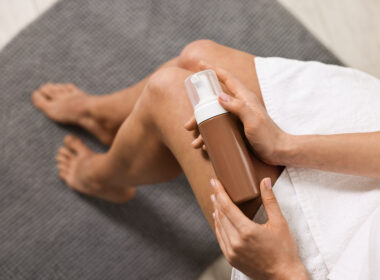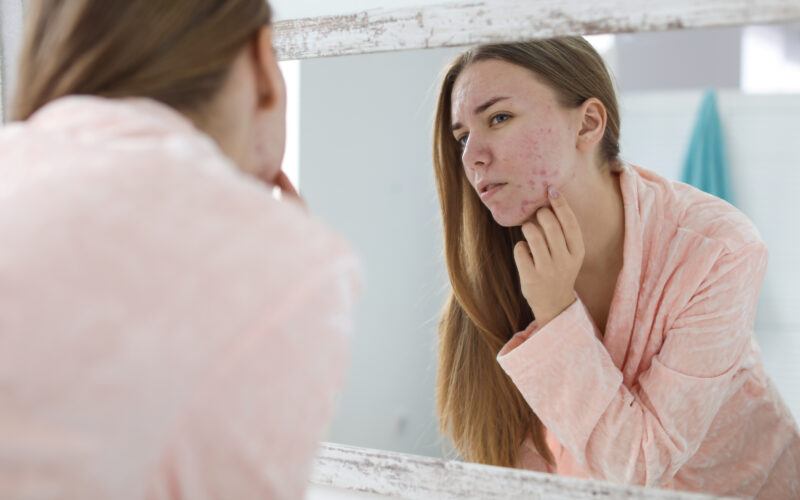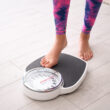A common reason teenage girls and women begin taking birth control pills is to control their acne. On the surface, it seems like a good solution: After all, androgens (including testosterone) can cause acne, and the Pill can help decrease androgens, which can help reduce acne. However, as we’ve covered extensively here at Natural Womanhood, the Pill doesn’t actually treat hormonal imbalances, including the kind that can worsen acne, and it can introduce a host of side effects as well.
If you’re considering going off the Pill and have struggled with acne in the past, you may be worried about whether the acne will come back once you’re off birth control and how to handle it if it does. This article will lay out your four main lines of defense against post-Pill acne, no matter its cause.
Why did you have acne in the first place?
First of all, especially if you dealt with a lot of acne as a teenager, it’s understandable to be worried about acne. Going off the Pill can be a little scary, as I know from experience. You started taking it for a reason. But by going off birth control, you’re prioritizing your health. And you don’t have to sacrifice your skin in the process. (After all, the health of your skin is also an important element of your overall health.)
It’s possible, especially if you went on birth control as a teenager, that your acne won’t come back, or that it won’t be as severe as it was then. After all, adolescence is a time of natural hormonal fluctuations, where many of us experience acne that doesn’t necessarily last after we’ve reached an age that doesn’t end in “-teen” (besides the occasional breakout, anyway). However, some women, even women who didn’t have acne before taking birth control, experience what Dr. Lara Briden (author of Period Repair Manual) calls “post-Pill acne.”
Post-pill acne can happen either as a result of a temporary rise in androgens, or a rebound of the production of sebum (skin oils), which is suppressed with the drugs drospirenone (Yasmin) or cyproterone (Brenda or Diane). Dr. Jolene Brighten (author of Beyond the Pill) adds that birth control “depletes nutrients like crazy,” and one of those nutrients is zinc, which helps the body use vitamin A—which helps make skin healthy and reduces acne.
If you have a condition (diagnosed or not) like polycystic ovary syndrome (PCOS), and your symptoms (which can include acne) were managed with birth control, they will likely return after you come off the Pill. Fortunately, as your body adjusts to its pre-birth control “normal,” you’ll be able to start monitoring your symptoms and working with a restorative reproductive medical provider to identify and treat any hormonal conditions that may be causing your acne (or any other symptoms you may be experiencing).
4 things you can do about post-Pill acne
The good news, according to Dr. Brighten, is that women who are taking steps to heal their body post-Pill will typically find that their skin improves in three to five months. No matter the cause of your post-Pill acne, you have four main lines of defense to help combat your skin woes. Broadly, they are: finding the right supplements, eating the right food, managing stress, and using the right beauty products.
Skin-saving supplements
Dr. Brighten says taking a prenatal vitamin can help “replenish the nutrients the Pill has depleted,” including vitamin B12, folate, selenium, zinc, magnesium, and vitamin C. She also recommends taking a probiotic, getting enough fiber, and using a supplement with diindolylmethane (DIM), calcium-D-glucarate, green tea extract, and broccoli seed extract to support the liver and help your gut get rid of extra estrogen. Dr. Briden also recommends the supplements zinc, DIM, berberine, and gentian or betaine hydrochloride (HCL). (Of course, it’s always a good idea to talk to your doctor before taking a new supplement.)
Nutritious diet
Dr. Brighten and Dr. Briden both recommend limiting sugar and avoiding dairy (Dr. Briden specifically recommends avoiding A1 cow dairy), both of which can be inflammatory foods. Unfortunately, according to dermatologists interviewed for Verily Magazine, substituting artificial sweeteners for sugar won’t help; they can have the same impact on hormones that real sugar has. Sugar can also feed the “bad bugs” in your gut, and especially after suffering the negative effects of birth control, your gut could use all the love (and “good bug”-feeding foods it can get!).
It’s also important to take a look at how much water you’re drinking; hydration helps reduce inflammation, which can also help your skin stay clear and bright. On that note, adopting an anti-inflammatory diet could help reduce breakouts, too.
Manage stress
Reducing your stress and making sure you’re getting enough exercise and sleep are also good steps to take when trying to combat breakouts. Thankfully, since hormonal birth control can both negatively affect sleep and your body’s ability to cope with stress, you might find yourself sleeping easier and stressing less post-Pill, which could benefit your complexion, too.
Clean beauty products
Finally, while it can be tempting to slather on the cover-up when you have a bad breakout, it’s important to make sure that any makeup you use is “non-comedogenic (non-pore clogging), non-drying, and made without skin-irritating chemicals,” according to an article by Natural Womanhood editor Grace Emily Stark. Dermatologists often recommend using a cleanser with a mild acne treatment (benzoyl peroxide or salicylic acid, for example) and moisturizing with a non-oil-based moisturizer, to both prevent and treat breakouts.
How fertility awareness can help you get to the source of your acne
Charting your cycle with a fertility awareness method can help you identify when your acne is at its worst. Knowing when you’re likely to have an outbreak can help you plan, help you and your medical provider identify any underlying conditions that may be causing the acne, and help you target interventions for those times in your cycle. If you also chart things like stress (a good idea anyway for monitoring and managing your health and fertility, especially after such a big transition!), you might also be able to identify other causes of your acne.
Acne can be difficult to live with, but there’s hope, even without birth control. By working with your medical provider to care for your hormonal health and taking steps to care for your skin more naturally, you can have clearer skin—without the health risks and problems that come with the Pill.
Additional Reading:
Ways to get rid of acne without the Pill
Coming off the Pill: Cassie’s story







